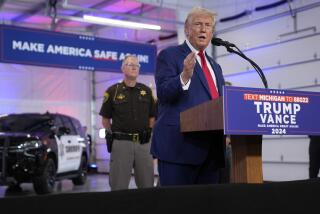The ‘Anybody But Cory’ Coup : Philippines: A convergence of President Aquino’s weakness and the strength of her rivals has come within a hairbreadth of toppling her government. And she may not last.
- Share via
MANILA — Col. Gregorio (Gringo) Honasan, the populist right-wing leader of the catastrophic and nearly successful uprising here, defines a coup as “a function of (a) clear signal from a people to its military.” That definition, offered in a published interview only the week before the coup began, put the Aquino government on notice. But the “clear signals” have been blinking for months.
Manila is a city of crises in a nation in crisis. Garbage has piled up on every street. Brownouts bring the city to a halt for up to six hours a day. Public transit is so bad that some workers spend five hours a day hanging onto the backs of fume-spewing “jeepneys” to commute to work. The day before the coup, the government raised the price of gasoline by 25%, despite clear intelligence on the coup plot and despite the fact that Honasan’s last coup attempt came just after a similar rise, with its immediate economic consequences for the poor. This city is palpably fed up.
President Corazon Aquino has used up the capital of the 1986 “people’s power” revolution and is being judged on her merits, now found wanting. To the taxi driver she appears as corrupt as Ferdinand Marcos because of her toleration of family fingers in the cookie jar. Small wonder that some columnists now remind readers nostalgically that the late dictator was at least smart enough to keep the price of gas and rice low and the streets clean and safe.
The Philippines hungers for strong leadership. The most recent 1992 presidential preference poll showed that the military hero of the 1986 revolution and current secretary of national defense, Gen. Fidel Ramos, is the strongest candidate, though far from the only one.
In fact, the stage was set for Honasan’s move by a successful coup de theatre a week before, in the mysterious descent from the skies of Aquino’s billionaire cousin and political rival, Eduardo (Danding) Cojuangco. After four years of exile life in Los Angeles, this one-time Marcos crony managed to evade security and arrive secretly in Manila. Once he was here, no one could talk about anything else--until the coup.
This formidable man upstaged the president with his mere presence. His power and hold on sections of the country’s military and political elite are overwhelming; that the country’s richest man could reconstruct the presidential sweepstakes is as much a comment on Danding Cojuangco’s strength as on cousin Cory’s weakness. “Unless the military kills him, he will be president in 1992, by hook or crook,” a leading columnist said. No one breathed a word of right or wrong; everyone ran to curry favor.
The presumption of a connection between Cojuangco’s return and the coup is irresistible, but speculative. At the least, Honasan took advantage of the humiliation that Cojuangco’s arrival brought Aquino. And Honasan’s sense that the public was fed up is confirmed by the extent to which bystanders, before the tide turned in the coup, flashed Marcos “V” signals, suggesting less a love for Marcos than an “ABC”--Anybody But Cory--attitude.
The coup itself started as an open-handed game; all but the American cards and plays were known in advance. Notably absent was the “people’s power” card that was decisive in ridding the country of Marcos in 1986. What mattered in 1989 was American air power. When the U.S. Phantoms cracked across Manila from Clark Air Base on Friday afternoon, the coup was doomed, though not immediately dead.
The American military card has always been assumed to be an automatic trump, but since independence it has never openly been played here. What the United States contributed operationally was less important than the seemingly open-ended promise of support. Once Manila’s leaders knew they wouldn’t be losers, they began opening fire on the rebels. As even the president conceded, until then the troops and pilots were sitting on the fence.
Aquino has promised justice, with a glint of steel, for the rebels. She made the same vows last time, in 1987, but soon the mood turned to forgiveness, sweetened by a military pay increase. Honasan is the country’s Rambo and it remains to be seen whether his influence can be eradicated.
The coup attempts are the product of a leadership vacuum. The country is sated with weakness, and Aquino now will have to shape up or be pushed aside. “There is no way she can last out her term (until 1992) going on like this,” a senator told me. Even her decision to wear slacks in the presidential palace for the first time is an indication that she understands the problem in this obsessively macho culture.
Many believe that the top military brass will have to take control, perhaps as regents ruling in her name. Ramos, a West Point graduate, has angrily denied any such intent. “I did not put down five coups to let this country become a banana republic,” he has said. But he is also a realist, and a lot has happened in the past four days. These events have so grievously damaged the Philippines that anything is now seen as possible.
More to Read
Sign up for Essential California
The most important California stories and recommendations in your inbox every morning.
You may occasionally receive promotional content from the Los Angeles Times.












